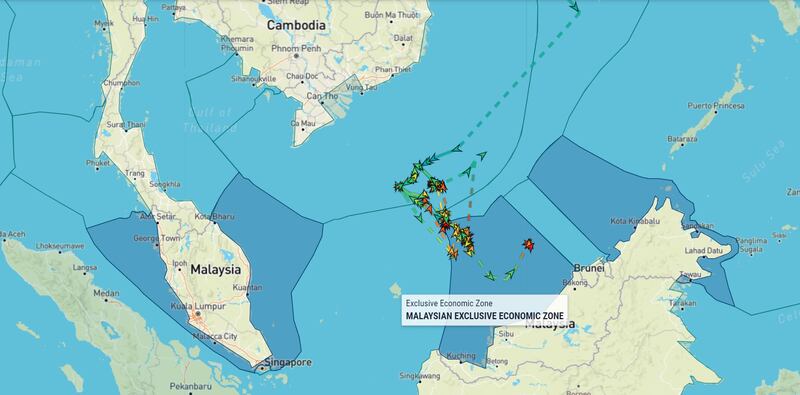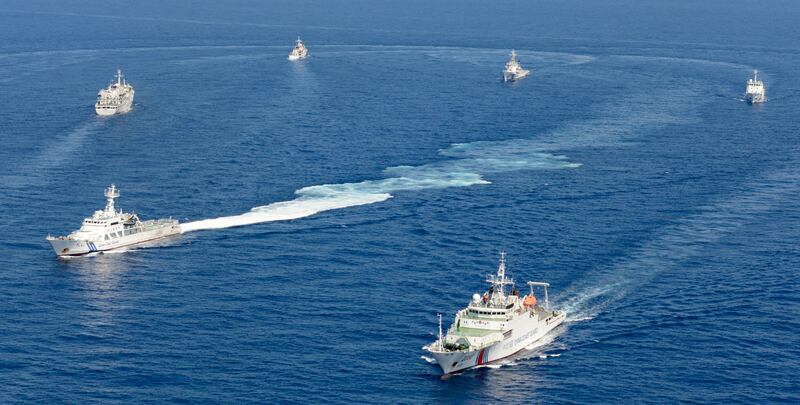Updated at 10:33 a.m. ET on 2023-01-31
The increasingly powerful Chinese coast guard has boosted its presence to an unprecedented level in the disputed waters of the South China Sea, a new report alleges.
Meanwhile, Chinese and Japanese coast guard ships appeared to have had a brief but tense confrontation near the contested Senkaku (Diaoyu) Islands in the East China Sea on Monday.
The report ' Flooding the Zone: China Coast Guard Patrols in 2022' by the Asia Maritime Transparency Initiative (AMTI), a research institution at the Center for Strategic and International Studies in Washington D.C., asserted that, "China's coast guard presence in the South China Sea is more robust than ever."
It said “the China Coast Guard (CCG) maintained near-daily patrols at key features” claimed by China and other neighboring countries.
Together with the ever-growing force of maritime militia, the CCG patrols “show Beijing’s determination to assert control over the vast maritime zone within its claimed nine-dash line,” the report said.
The so-called nine-dash line is an imaginary boundary that Beijing uses to demarcate its “historical claims” over nearly 90% of the South China Sea.
China’s claims are disputed by other countries and were rejected by an U.N. tribunal in 2016.
Largest coast guard vessel
The AMTI team analyzed ships’ automatic identification system (AIS) data from the year 2022 across the five features: Second Thomas Shoal, Luconia Shoals, Scarborough Shoal, Vanguard Bank, and Thitu Island.
Several countries hold contesting claims over all the five features but, so far, China has been the most assertive.
CCG “patrols across all five features amounted to 1,703 ship-days in total,” according to the AMTI report, which also noted that the number of days the CCG patrolled at Vanguard Bank, an important site of Vietnamese oil and gas development, more than doubled from 142 days in 2020 to 310 days in 2022.
This has been a major concern for Vietnamese authorities as Vietnam’s economy relies heavily on its oil and gas industry.
“Vanguard Bank, called Bai Tu Chinh in Vietnamese, has become some kind of stopover for Chinese patroling vessels,” said Van Pham, chief administrator of the South China Sea Chronicle Initiative, a Vietnamese independent research project.
“They often anchor at the bank before continuing their patrols,” she said.
“In 2021, CCG ships from Vanguard Bank regularly approached Vietnam’s Lan Tay and Lan Do gas fields, sometimes so close that they would be inside the fields’ security areas and jeopardizing the pipeline,” the analyst said.
Vanguard Bank is where Chinese and Vietnamese law enforcement vessels confronted each other in July 2019, one of the worst standoffs between the two countries in the South China Sea in recent years.
“CCG vessels in general move from one patrol location to another, including spending time at Vanguard Bank and then passing by Tuna Block, an Indonesian gas field in Natuna Sea, en route to Malaysia’s Luconia Shoals,” said AMTI Director Greg Poling.

Indonesian and Malaysian law enforcement were both put on alert this month when China’s largest coast guard ship 5901 operated in their exclusive economic zones (EEZs).
An EEZ gives a state exclusive access to the natural resources in the waters and seabed but those in the South China Sea overlap with China’s nine-dash line.
Jakarta and Kuala Lumpur both sent naval ships to monitor the Chinese vessel’s movements.
The CCG5901, also the world’s largest coast guard vessel, was still in the area on Tuesday, according to data provided by ship-tracking website MarineTraffic.
Confrontations and accidents
“All indications are that these trends will hold in 2023. China will keep the CCG patrolling these locations daily, will harass new oil and gas drilling, and will deploy hundreds of militia in the Spratlys,” Poling told RFA.
“The Philippines, Indonesia and Vietnam all stood more or less firm in 2022, which I'd expect to continue this year,” he added. “But there will inevitably be tense run ins and potential accidents that could escalate.”

Japanese media reported that four Chinese coast guard ships tried to approach a Japanese-registered private vessel in Japan's territorial waters around the Senkaku Islands in the East China Sea on Monday.
This is the second time this year Chinese law enforcement ships were accused of intruding into Japanese waters around the Senkaku chain.
Japan Coast Guard patrol ships secured the safety of the 997-ton Shinsei Maru and warned the Chinese ships to leave the waters, Jiji Press reported.
The ship is said to have been conducting marine research around the Senkakus. Researchers also flew a drone to take images of the islands.
Chinese state media meanwhile said China's coast guard "expelled Japanese ships that illegally entered Chinese territorial waters around the Diaoyu Islands," using the Chinese name for the Senkaku islands which are under Japan's control but also claimed by China.
“China Coast Guard vessels took necessary management and control measures and warned them away according to the law,” a Chinese spokesman was quoted as saying.
Japan said Chinese vessels have intensified activities around Japan after Tokyo designated Beijing an unprecedented “strategic challenge” in its latest National Security Strategy in mid-December.
Chinese warships of the Liaoning carrier group held exercises near Japan in December, 2022, simulating attacks on Japan’s outlying Nansei islands. Tokyo said it would acquire more “counter strike” capabilities and has already planned to bolster missile and electronic warfare capacity on those islands.
Asked about the AMTI report at a regular news briefing in Beijing on Tuesday, Chinese Foreign Ministry spokesperson Mao Ning said China followed international law in its South China Sea conduct.
In accordance with China’s domestic law and international law, including the United Nations Convention on the Law of the Sea (UNCLOS), “Chinese Coast Guard vessels conduct patrols in jurisdictional waters claimed by China to maintain maritime order, and defend China’s legitimate and lawful rights and interests.”
“China is ready to work with relevant parties to continue to properly manage maritime disputes though dialogue and consultation.”
Radio Free Asia (RFA) is a news service affiliated with BenarNews.
